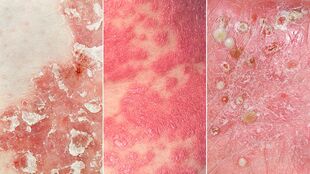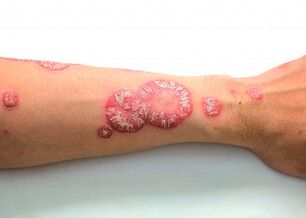The causes of psoriasis could not be determined. But scientists agree that a number of factors can cause skin disease. This is confirmed by medical research and observations by professionals. Taking into account the characteristics of the disease, we assess the origin of the disease in children and adults; during pregnancy in women; in patients with overweight depressive central nervous system disorders.
Characteristics of the disease
Psoriasis is a serious dermatological disease of an autoimmune nature. The disease can also be felt in infancy and adulthood. Under certain conditions, the patient has severe relapses even after long-term treatment. The duration of remission depends on the severity of the case, age, general health, and the presence of chronic diseases.
Externally, the disease presents as a reddish-pink spot. The rash can occur on any part of the body. Often horny. Exacerbation is accompanied by severe itching, the spread of the area of inflammation to healthy areas of the epidermis.
The causes of psoriasis are still being investigated; effective psoriasis therapies are being developed with the goal of improving both the patient’s internal condition and skin cleansing.
Causes of psoriasis
Psoriasis: There are several causes for this unpleasant skin disease. If a person is diagnosed with this diagnosis, experts will prescribe treatment, taking into account the existing inheritance, predisposition to allergies, possible hormonal disorders, previous infections, metabolic disorders. Doctors take into account the patient’s poor quality of nutrition, stress, the presence of bad habits, and an unhealthy lifestyle.
To clarify the cause of psoriasis, health indicators are first analyzed, taking into account the patient’s age and gender. Research is then conducted in a number of generally accepted theoretical areas, all of which are considered below. A detailed summary of the results obtained will help professionals to prescribe effective treatment.
The most common forms are
- guttate psoriasis;
- palm-foot (psoriasis on head, elbow)
- nails, hand psoriasis;
- psoriasis erythroderma (skin rashes on the whole body, including the head);
- pustular form (overgrowth of plaques and abscesses);
- arthritis of the joints (not only damage to the cells of the epidermis, but also inflammation of the joints, gradual deformation) and a few others.
Causes of Childhood Illness
Psoriasis in infants and young children is caused by a genetic predisposition. If the family’s parents, close or distant relatives have suffered from any form of the disease, in 80% of cases the child will inherit. The disease may not be immediate, but in the background of any mild illness, such as a virus or cold. There are other causes of psoriasis in children:
The disease may not be immediate, but in the background of any mild illness, such as a virus or cold. There are other causes of psoriasis in children:
- Disorder of the immune system due to the attack of protective cells on their own tissues, referring to strangers. When this process occurs, antibodies against the antigens inside the balance are found in the child’s blood.
- Congenital, acquired liver disease.
- Parasites in the intestines.
- Mental disorders, severe emotional stress, dissatisfaction with oneself and others (often in adolescence), long-term experiences.
- Metabolic disorders: slowing down of metabolic processes, which results in low body temperature, rising of “harmful” cholesterol, lack of B vitamins, in the epidermis, on the contrary, an increase in the amount of element C.
Medical practice confirms that the causes of psoriasis in children can be very individual.
Causes of psoriasis in adult men and women
What causes psoriasis in adults? The causes of psoriasis in women and men have a number of common factors. But due to physiology, thyroid disorders, hormonal changes, women are at higher risk of developing the disease in adulthood. Consider the symptoms of psoriasis in adults: men and women.
For men
The disease traditionally begins with a characteristic skin lesion. Red, flaky spots on any area of the body are signs of the early stages of the disease. Why does it manifest itself?
Psoriasis in men is due to phenomena such as:
- central nervous system overload due to prolonged depressive states;
- alcohol consumption, smoking;
- overweight, slows down metabolism;
- lives or works in a polluted environment;
- Dry structure of the upper layer of the epidermis, skin poorly protected due to insufficient moisture / low water intake.
for women
Causes of psoriasis in women include:
- genetics;
- weakened immune system (fewer leukocytes are produced, the quality of tissue nutrition deteriorates);
- Vitamin A-B group deficiency;
- high cholesterol, metabolic disorders;
- infectious diseases that do not heal in time;
- emotional disorders;
- Undetected thyroid disorders that gradually lead to hormonal disorders.
Theories of psoriasis

After much research analyzing the origins of eczema in children and adults, scientists have begun to adhere to a number of theories. They not only provide an understanding of the symptoms that occur in the first and subsequent stages of the disease, but also explain the causes of exacerbation of psoriasis, cases of relapse. Consider each theory.
Immune
Doctors say any focal infection can cause psoriasis in your body. For example, chronic tonsillitis causes immune deficiency. Immune system disorders are the first step in the development of dermatitis.
Accidental damage to the surface of the epidermis can lead to the development of a focus where severe inflammation develops in the future, to which the body responds with autoimmune aggression (approximately deceiving its cells as foreign). Rejection occurs. Further along the chain, with any damage to the skin, psoriasis scales usually form.
Hereditary
It is not difficult to understand the essence of the theory of inheritance, as mentioned above. If relatives suffer from an autoimmune disease regardless of the age of a patient’s family, there is still a high risk of the disease.
Viral
According to viral theory, psoriasis is referred to as a retroviral lymphotropic infection. Herbal antiviral agents are often used to treat psoriasis. It is believed that if a person is prone to the disease, their immunity will not be able to "resist" the psoriasis virus. Thanks to the latest technologies, institutes of physical and chemical medicine are developing new drugs that can achieve long-term remission.
Allergic
Because psoriasis is primarily a dermatological disease, allergic theory is still relevant today. Many doctors are of the opinion that the disease is of purely allergic origin. This is especially true for arthritis of psoriasis. Allergic theory is closely related to the infectious, as the disease is an allergic tissue reaction to the structure of streptococci, viral bacteria.
Neurogenic
This theory is associated with functional disorders of the nervous system. Practice shows that before the onset of the disease, many patients with psoriasis suffered from mental, physical trauma, burns, and bruises. The neurogenic effect is enhanced when the patient is prescribed medications to normalize the autonomic and central nervous systems. It has been proven that depression, stress, emotional overload can trigger relapse.
Disorders of metabolic processes
The theory of metabolism is based on several studies, observing the course of the disease, when patients suffer from lipoid metabolic disorders in addition to the disease under study. Being overweight directly affects the deterioration of blood composition, the biosynthetic functions of the liver. Toxins accumulate, protective functions are reduced. Bottom line: the body "reacts" with skin rashes. The initial stage begins, with plaques appearing on the hands and palms.

Hormonal
Hormonal theory is closely related to the theory of metabolic disorders. The causes of psoriasis in terms of hormonal imbalance are primarily studied in women. Being overweight and obese in men also leads to hormonal disorders, causing eczema.
Infectious
Infectious theory, along with parasite theory, comes first. In 1879, scientists discovered a "parasitic fungus. "But subsequent studies have not confirmed this fact. External infections affect immunity and therefore may affect the development of pathology. In practice, patients with psoriasis regularly suffered from colds and viral illnesses in the fall and winter.
Factors influencing the appearance of psoriasis
Factors that directly affect the development of psoriasis are shown in a table:
| Name | Risk of initial stage (%) | Risk of relapse (%) |
| Stress, trauma | 49 | 41 |
| Infections | 15 | 21 |
| Physical injury | 14 | 12 |
| Breastfeeding, adolescence, menopause | 6 | 6 |
| Hypothermia | 5 | 4 |
| Long-term medication | 3 | 6 |
| Alcohol Poisoning | 2 | 3 |
| Long sun exposure | 2 | 2 |
The factors presented are the most important. Let’s look at some of them in more detail.
Infectious Diseases
Infectious diseases lead to the development of psoriasis in people with a genetic predisposition; very weak immunity. Such diseases:
- bronchitis;
- sore throat;
- pharyngitis;
- with flu complications;
- staphylococcus, fungal infections.
Untreated infection, self-medication, or illiterate medications will sooner or later provoke dermatosis. It is important to see a doctor in time, not to start treatment.
Pregnancy
Pregnancy is characterized by global hormonal changes in the body. Immunity weakens every force used to maintain fetal development. Psoriasis rashes occur during pregnancy and subsequent breastfeeding. Usually, after the body recovers and the hormones normalize, the disease subsides or disappears completely.
Injury and damage to the surface of the epidermis
Mechanical damage to the skin can create a favorable environment for the development of dermatosis at the wound site. After recovery, plaques of psoriasis appear. According to many dermatologists, in this case, the body reacts aggressively to its own cells.
Bad habits
Because alcohol consumption and smoking negatively affect everyone’s health, doctors tend to believe that people with such habits are at risk. At a young age, the body will still have the strength to cope with such a "load. "But health is gradually deteriorating. The main causes of psoriasis are bad habits in addition to stress.
Using Illegal Drugs

It is recommended that people with weak nerves, emotions, hypersensitivity and those at risk do not take self-medication. It is important to contact the relevant professionals regarding the possibility of using illicit drugs. An allergic reaction to the drug can trigger dermatosis. Not all medicines can be used during pregnancy.
An illiterate approach to treating a mild illness could lead to the development of severe autoimmune dermatosis in the future.
Eating Disorder
A diet for psoriasis is mandatory. It should not be forgotten that with the help of certain food products, the patient has the opportunity to quickly overcome the relapse, solidify the result, and completely forget about the medicinal creams and ointments for psoriasis.
Spiritual causes
Psoriasis is the need to accept yourself, your illness, your skin, give up guilt, and be positive. The psychic factor, the mood of the person is one of the reasons for the appearance of psoriasis eczema. The atmosphere of calm, the successful result contributes to the normal course of healing, to achieving a healthy skin surface.
Disease prediction
Psoriasis appears not only on the skin but also on the internal organs. It is important for patients to respect their own health, state of mind and nutrition. The disease forces a person to choose: either a healthy lifestyle or psoriasis. Treatment involves not only the use of ointments and other tools, but also the cleansing of the body from the inside, the removal of toxins. The key to success in the fight against psoriasis is based on a positive attitude, following your doctor’s recommendations, diet, and eliminating stress.
The key to success in the fight against psoriasis is based on a positive attitude, following your doctor’s recommendations, diet, and eliminating stress.























